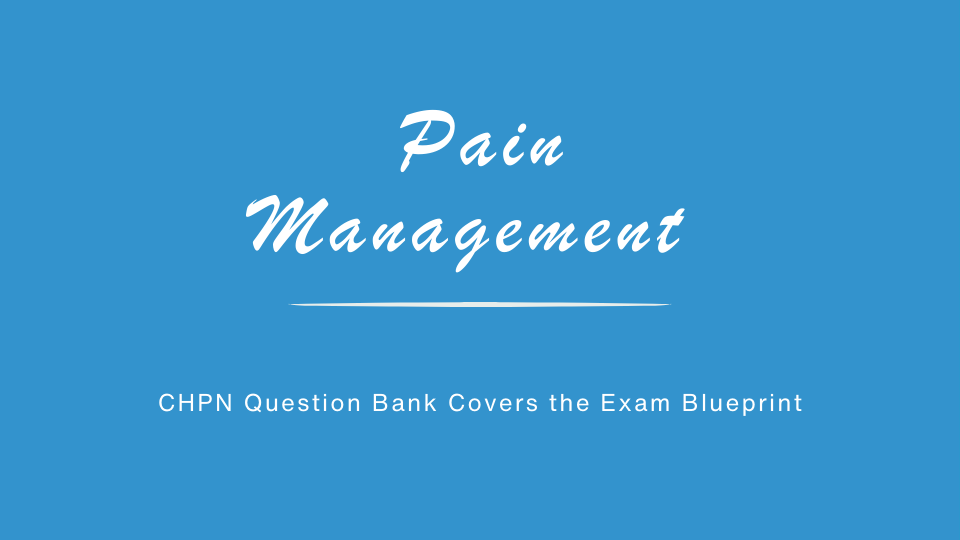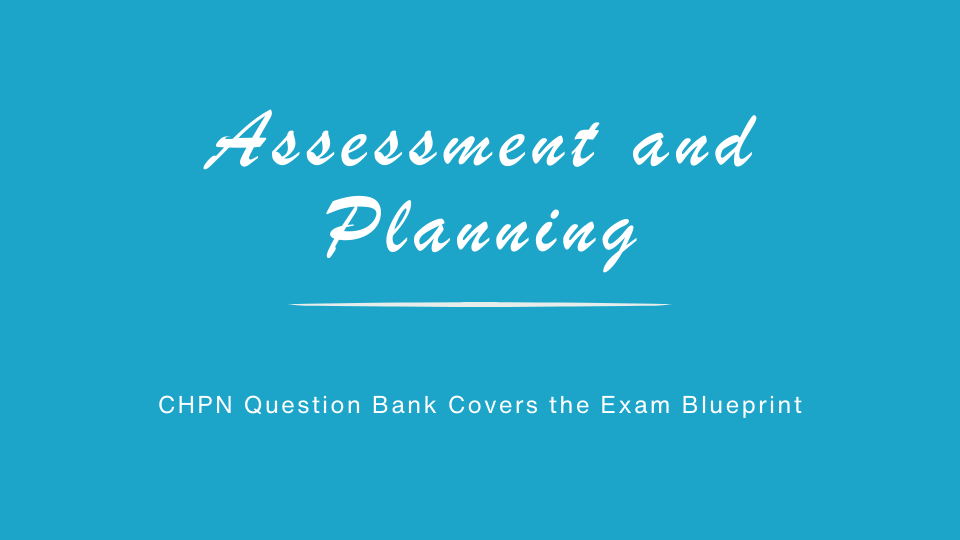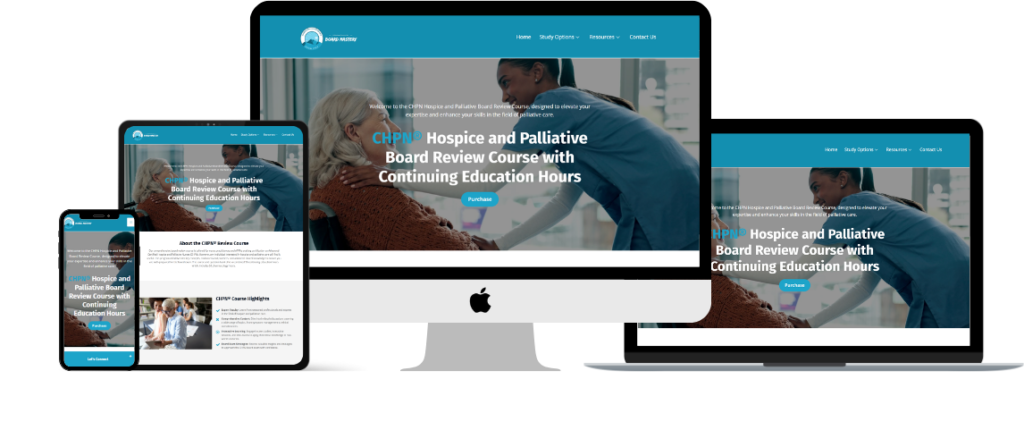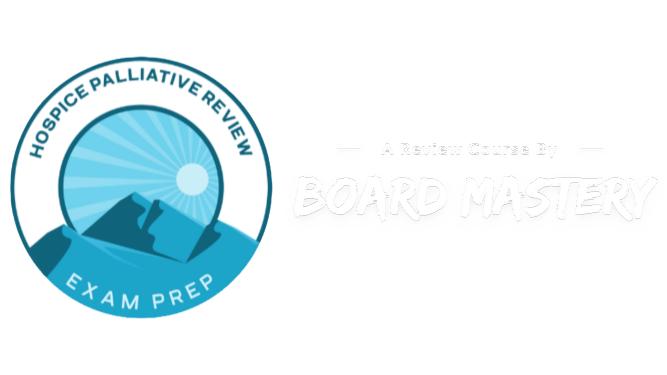CHPN® Practice Test Question Bank
Preparing for the Certified Hospice and Palliative Nurse (CHPN®) Certification Exam can be challenging, but with the right resources, success is within reach. Our expert-designed CHPN Practice Test Question Bank offers the tools you need to feel confident and ready for exam day.
$97 Price - Question Bank
7-day money back guarantee
- 1,400 practice test questions, designed to simulate the real exam and cover the complete exam blueprint
- Get 6-month access to the question bank
- Every question is reviewed and edited by CHPN® certified faculty
- Study anytime, anywhere, on any device with our mobile responsive platform
- Bonus: 4 predictor exams designed to test your exam readiness
Get Details for the CHPN® Practice Test Question Bank
Question Bank
Read more about the question bank
- Extensive Question Bank: Over 1,400 practice test questions mirroring the CHPN® exam
- Diverse Topics Covered: The question bank spans a wide range of topics focused on the CHPN® exam blueprint
- Realistic Exam Simulation: Questions designed to closely resemble the format and difficulty level of the CHPN® certification test, including carefully crafted third-order questions
- Detailed Explanations: Each practice question includes detailed explanations with citations, providing valuable insights
Practice Questions Aligned with the Exam Blueprint and Expertly Reviewed by CHPN® Certified Faculty
Prepare confidently with practice test questions that cover the exam blueprint, ensuring a comprehensive understanding of the material. All questions are thoroughly reviewed by CHPN® certified faculty to guarantee accuracy and relevance to the certification exam.

Support, Education, and Advocacy
- Advance care planning
- Medicare, Medicaid, and private insurance
- Patient safety:
- Communication
- Psychosocial, spiritual, and cultural needs
- Medications and controlled substances
- Caregiver/Family self-care activities
- End-stage disease at terminal phase
- Grief and loss support / bereavement services
- Support at time of death
- Ethical issues related to end of life

Practice Issues
- Hospice and palliative care compliance under Medicare/Medicaid
- National hospice and palliative care standards
- National practice guidelines and standards (e.g., National Consensus Project)
- Legal regulations (e.g., OSHA, CMS, HIPAA)
- Professional boundaries
- Strategies for self-care and stress management
- Trends in legislation, policy, health care delivery, and reimbursement as they impact hospice and palliative care

Pain Management
- Etiology of pain, types of pain, and pain syndromes
- Verbal and nonverbal indicators of pain and pain scales
- Factors that may influence the patient’s experience of pain
- Complementary and alternative therapies
- Medications appropriate to severity and specific type of pain
- Titration of medication to determine baseline and breakthrough doses
- Dosage equivalents when changing analgesics or route of administration
- Non-pharmacologic interventions
- Complementary and alternative therapies

Assessment, Planning, & Symptom Management
- Goals of care and shared decision making
- Interdisciplinary care planning and ongoing evaluation
- Life-limiting disease progression, complications, and treatment
-
Indicators of imminent death
- Neurological
- Cardiovascular
- Gastrointestinal
- Genitourinary
- Skin and mucous membrane
- Nutritional and metabolic
- Immune/Lymphatic/Hematologic system
- Psychosocial, emotional, and spiritual
Free CHPN® Practice Test Questions - Sample Questions
1: A hospice patient with congestive heart failure and a do-not-resuscitate (DNR) order is planning a flight to visit family. The nurse should inform the family that:
(a) The airline crew is required to follow the DNR order
(b) A DNR order may not be honored on a commercial flight
(c) The family must bring a physician to ensure the DNR order is followed
(d) Airline policy mandates that CPR is always withheld for DNR patients
2: A patient with a Palliative Performance Scale (PPS) score of 70% is likely to exhibit which of the following characteristics?
(a) Requires total care, bedbound
(b) Ambulatory and can perform some self-care tasks
(c) Fully independent with no disease symptoms
(d) Confined to a wheelchair and unable to perform any self-care
3: Which of the following medications is least likely to cause central nervous system (CNS) side effects such as delirium when treating refractory terminal respiratory secretions?
(a) Scopolamine
(b) Atropine
(c) Hyoscyamine
(d) Skin
4: Which statement accurately differentiates anticipatory grief from bereavement?
(a) Anticipatory grief occurs only after a person is formally diagnosed with a terminal illness.
(b) Bereavement refers to emotional preparation for death, while anticipatory grief occurs only after the death.
(c) Anticipatory grief is experienced before death, while bereavement occurs after the loss.
(d) Anticipatory grief involves anger but bereavement does not.
5: A palliative care nurse discusses the principle of double effect with a new nurse. Which of the following scenarios best illustrates the principle of double effect?
(a) Using opioids for severe pain management in a patient with a prognosis of days, knowing that respiratory depression could occur as an unintended side effect
(b) Increasing opioid doses to deliberately cause respiratory arrest and hasten death
(c) Stopping a patient’s hydration because of the belief that fluids are unnecessary in the dying process
(d) Ordering a benzodiazepine and opioid together
Question 1:
Answer: (b)
Rationale:
(B) Correct. Airline crews are not mandated to follow DNR orders on flights, especially if the flight crosses state or national borders. The family should be aware that CPR may be initiated by the crew if the patient dies during the flight.
(A) Incorrect. Airline crews are not required by law to honor DNR orders.
(C) Incorrect. Bringing a physician is not a solution, as airline policies will still dictate what happens.
(D) Incorrect. Airlines do not automatically withhold CPR based on DNR orders; their policies vary, and some may initiate CPR unless otherwise directed.
Source: Air Travel at the End-of-Life
Exam domain category: Support/education/advocacy | Subcategory: Patient safety: environmental, physical, socioemotional
Question 2:
Answer: (a)
Rationale:
(B) Correct. A PPS score of 70% indicates the patient is ambulatory and can carry out some self-care activities, although they may require occasional assistance.
(A) Incorrect. Total care and bedbound status would be seen in a patient with a PPS score of 30% or lower.
(C) Incorrect. A patient who is fully independent with no symptoms would score 100% on the PPS, indicating no functional decline.
(D) Incorrect. A patient confined to a wheelchair unable to perform any self-care tasks would typically have a PPS score of 50%, which reflects more significant functional impairment.
Source: The Palliative Performance Scale
Exam domain category: Assessment and Planning | Subcategory: Life-limiting disease progression, complications, and treatment
Question 3:
Answer: (c)
Rationale:
(D) Correct. Glycopyrrolate is a quaternary amine that does not cross the blood-brain barrier, making it less likely to cause CNS toxicity such as delirium or sedation.
(A) Incorrect. Scopolamine is a tertiary amine and is more likely to cause CNS side effects, including delirium.
(B) Incorrect. Atropine, also a tertiary amine, crosses the blood-brain barrier and may cause CNS side effects.
(C) Incorrect. Hyoscyamine is another tertiary amine that can cause CNS side effects, including confusion and delirium.
Source: Death Rattle and Oral Secretions
Exam domain category: Symptom Management | Subcategory: Respiratory
Question 4:
Answer: (c)
Rationale:
(C) Correct. Anticipatory grief happens when individuals begin emotionally preparing for an impending death, while bereavement refers to the grief experienced after the loss.
(A) Incorrect. Anticipatory grief can begin at various points, not only after a formal diagnosis.
(B) Incorrect. Bereavement always follows the loss, not prior.
(D) Incorrect. Both forms of grief can involve various emotions, including anger.
Source: Grief and Bereavement
Exam domain category: Support/education/advocacy | Subcategory: Grief and loss support / bereavement services
Question 5:
Answer: (a)
Rationale:
(A) Correct. The principle of double effect supports the use of opioids for pain management, where the primary intention is relief of suffering, and any unintended adverse effect (like respiratory depression) is ethically permissible.
(B) Incorrect. Intentionally hastening death contradicts the principle of double effect.
(C) Incorrect. Discontinuing hydration may be appropriate but does not directly involve the principle of double effect.
(D) Incorrect. The principle of double effect is not about the act of combining two medications but rather about the ethical reasoning behind an action that has both a good effect (e.g., symptom relief) and an unavoidable harmful side effect (e.g., respiratory depression). The key is that the harmful effect must not be intended. Combining two medications does not invoke the principle of double effect.
Source: Bioethical Distinctions of End-of-Life Care Practices
Exam domain category: Support/education/advocacy | Subcategory: Ethical issues related to end of life

Your Path to CHPN® Certification Starts Here!
Are you preparing to become a Certified Hospice and Palliative Nurse (CHPN®)? Our expertly crafted CHPN® Question Bank is designed to equip you with the practice, knowledge, and confidence needed to excel on the exam and advance your career in hospice and palliative care.
Extensive Question Bank to Study for CHPN® Exam
Our CHPN® Exam Question Bank features a robust question bank with over 1,400 practice questions meticulously designed to reflect the format and content of the actual exam, following the CHPN® exam blueprint. Developed and reviewed by CHPN®-certified faculty, this resource also includes four predictor exams to help you gauge your readiness and focus your study efforts. Covering all key areas—such as pain and symptom management, end-of-life care, ethics, communication, and professional practice—this comprehensive tool ensures you are fully prepared to excel on the CHPN® exam.
Mobile Phone and Tablet Compatibility

Take your preparation with you wherever you go! Our CHPN® Exam Practice Question Bank features a user-friendly platform optimized for both Android and iOS devices. Access the comprehensive CHPN® question bank and predictor exams on your phone or tablet, allowing you to study anytime, anywhere. Make the most of your time and stay on track to achieve CHPN® certification success.
You receive:
- Access to the mobile responsive platform
- On-demand access anytime, anywhere
- Each question reviewed and edited by CHPN® faculty

Getting Started is Easy!
Getting Started is Easy!
- Sign Up: Create your account on our user-friendly platform.
- Access Resources: Dive into our extensive CHPN® practice question bank and comprehensive CHPN® predictor exams.
- Sign Up: Create your account on our user-friendly platform.
- Access Resources: Dive into our extensive CHPN® practice question bank and comprehensive CHPN® predictor exams.
Our Faculty

Ashley Williamson
MSN, MBA, RN, CMSRN, CHPN®
Ashley Williamson is a dedicated nursing professional with extensive experience in healthcare leadership, education, and compliance. She holds dual master’s degrees: a Master of Business Administration in Healthcare Management and a Master of Science in Nursing. Her credentials include certifications as a Certified Hospice and Palliative Nurse (CHPN) and a Certified Medical-Surgical Registered Nurse (CMSRN). Additionally, she serves as a CHAP Hospice Consultant.
With a career spanning roles such as Case Manager, Nursing Clinical Instructor, Informatics and Regulatory Compliance Specialist, Coordinator of Patient Services, and Director of Education and Compliance Training, Ashley has developed a robust skill set in clinical education, compliance, and operations. Outside of work, she enjoys spending time with her children, baking and cooking, crafting, and staying active.

Rachel Derry
BSN, RN, CHPN®
Rachel is a dynamic healthcare leader with extensive experience in strategic leadership, quality assurance, and regulatory compliance. As a Director for a hospice organization, she oversees education, quality, and compliance programs, driving operational excellence. Rachel is recognized for her ability to implement innovative solutions that enhance patient care.
As a Certified Hospice and Palliative Care Nurse (CHPN) since 2006 and an HPNA Approved Educator, Rachel is committed to advancing hospice and palliative care through education and mentorship. With a proven track record in developing quality programs and leading process improvements, she excels at engaging teams and mentoring future leaders. Outside of her professional endeavors, Rachel enjoys reading, hiking, traveling and spending time with her family.

Eizabeth Hayward
MBA, BSN, RN, CHPN®
Liz Hayward is an accomplished healthcare leader in hospice and palliative care. As the Director of Medical Services at a hospice organization, she leverages her extensive nursing experience in hospice to enhance care delivery and operational efficiency, ensuring patients receive compassionate, high-quality care.
With a Master’s degree in Business Administration and as a Certified Hospice and Palliative Nurse (CHPN), Liz brings extensive expertise to her leadership roles. She has experience both at the bedside and in other leadership roles, including serving as Associate Director of Clinical Services and Clinical Patient Care Manager. Outside of work, Liz enjoys traveling, reading, and spending time by the ocean.
Our CHPN® Faculty

Ashley Williamson, MSN, MBA, RN, CMSRN, CHPN®
Ashley Williamson is a dedicated nursing professional with extensive experience in healthcare leadership, education, and compliance. She holds dual master’s degrees: a Master of Business Administration in Healthcare Management and a Master of Science in Nursing. Her credentials include certifications as a Certified Hospice and Palliative Nurse (CHPN®) and a Certified Medical-Surgical Registered Nurse (CMSRN). Additionally, she serves as a CHAP Hospice Consultant.
With a career spanning roles such as Case Manager, Nursing Clinical Instructor, Informatics and Regulatory Compliance Specialist, Coordinator of Patient Services, and Director of Education and Compliance Training, Ashley has developed a robust skill set in clinical education, compliance, and operations. Outside of work, she enjoys spending time with her children, baking, cooking, crafting, and staying active.

Rachel Derry, BSN, RN, CHPN®
Rachel is a dynamic healthcare leader with extensive experience in strategic leadership, quality assurance, and regulatory compliance. As a Director for a hospice organization, she oversees education, quality, and compliance programs, driving operational excellence. Rachel is recognized for her ability to implement innovative solutions that enhance patient care.
As a Certified Hospice and Palliative Care Nurse (CHPN®) since 2006 and an HPNA Approved Educator, Rachel is committed to advancing hospice and palliative care through education and mentorship. With a proven track record in developing quality programs and leading process improvements, she excels at engaging teams and mentoring future leaders. Outside of her professional endeavors, Rachel enjoys reading, hiking, traveling and spending time with her family.

Elizabeth Hayward, MBA, BSN, RN, CHPN®
Liz Hayward is an accomplished healthcare leader in hospice and palliative care. As the Director of Medical Services at a hospice organization, she leverages her extensive nursing experience in hospice to enhance care delivery and operational efficiency, ensuring patients receive compassionate, high-quality care.
With a Master’s degree in Business Administration and as a Certified Hospice and Palliative Nurse (CHPN®), Liz brings extensive expertise to her leadership roles. She has experience both at the bedside and in other leadership roles, including serving as Associate Director of Clinical Services and Clinical Patient Care Manager. Outside of work, Liz enjoys traveling, reading, and spending time by the ocean.

7-Day Trial with 100% Money Back
We are committed to your success. We are so confident in the quality and effectiveness of our CHPN® Question Bank that we offer a 100% Money-Back Guarantee if you are not satisfied within 7 days of purchase.
Our Promise to You:
Everything Needed to Pass: Our question bank provides comprehensive coverage of the material you need to succeed in the CHPN® board exam. Our expert faculty has meticulously reviewed and edited the content, and it aligns with the exam blueprint.
First-Time Success: We are confident that our question bank equips you with the knowledge and skills necessary to pass the CHPN® certification on your first attempt.
Start Your CHPN® Journey Today!
Transform the CHPN® exam from a challenge into a milestone in your professional journey. Join our CHPN® Exam Prep community and access the tools, guidance, and support you need to succeed. Empower your career with confidence—your success is our mission!
Thank you for reaching out!
You can expect a response within 24 hours. We appreciate your patience.
Phone number: (307) 387-1492

 Helpful information
Helpful information